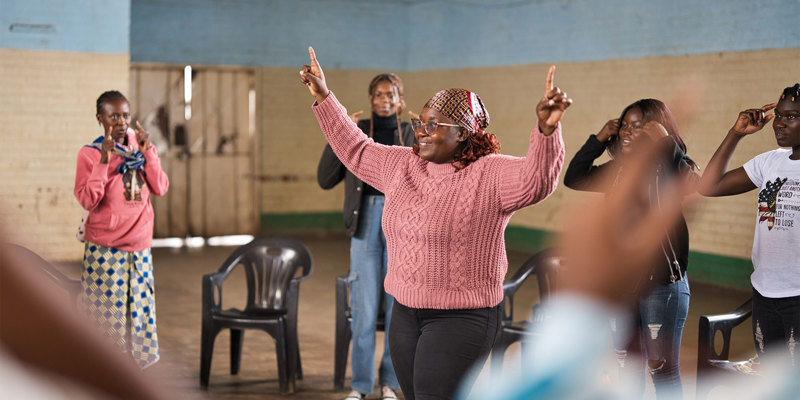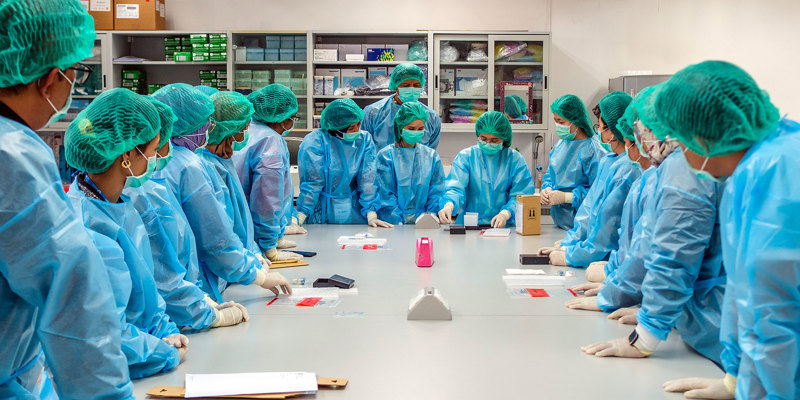Nine Major Companies Commit to Co-Investment to Expand Community HIV/AIDS Programs Using Corporate Infrastructure
03 December 2003
Nairobi, December 3, 2003 — Nine global companies with operations in developing countries — AngloAmerican, Bristol-Myers Squibb, Chevron Texaco, DaimlerChrysler, Eskom, Heineken, Lafarge, Pfizer and Tata Steel — announced today that they will use their facilities, employees and other infrastructure to expand workplace HIV/AIDS prevention and treatment programs into communities where they operate. By using infrastructure that was created to serve their employees, this corporate contribution will reduce the start-up and running costs of public programs.
The Global Fund to Fight AIDS, Tuberculosis and Malaria applauded the willingness of companies to co-invest with public programs and encouraged its Country Coordinating Mechanisms to work with these companies to develop concrete proposals for funding in the upcoming proposal round, to be launched in January 2004. Ambassador Randall Tobias, who oversees President George Bush’s Emergency Plan for AIDS Relief, also lauded the approach.
The announcement was made at the residence of Kenyan President Mwai Kibaki by U.S. Secretary of Health and Human Services Tommy Thompson, Ambassador Randall Tobias, Ambassador Richard Holbrooke, and international agency heads Dr. Richard Feachem, Dr. Jong-Wook Lee and Dr. Peter Piot. Secretary Thompson, Ambassadors Tobias and Holbrooke are leading a delegation of business, government and non-profit leaders to Africa to build greater awareness and support for the fight against HIV/AIDS.
“We came to Africa to increase private-sector engagement in the war on HIV/AIDS, and this announcement is exactly the kind of innovative idea we want to promote,” said Secretary Thompson. “Leveraging the resources of companies in this way is a great new opportunity for communities to realize the opportunity of the Global Fund.”
The co-investment approach will benefit the fight against HIV/AIDS by increasing business engagement, sharing and thereby reducing program costs and maximizing near-term absorption capacity. Such capacity will be critical to the achievement of such global targets as 3 million people on antiretrovirals by 2005 (“3 by 5”), for which WHO and UNAIDS are mobilizing focused technical support.
The contribution of businesses in co-invested programs will include infrastructure as well as project management capacity and is intended to advance country-wide approaches to fighting the disease. Infrastructure costs have accounted for almost 40 percent of the financial resources required to scale-up Botswana’s national AIDS treatment program, according to the African Comprehensive HIV/AIDS Partnership (ACHAP). Ambassador Holbrooke commented "This is only the beginning of what companies can do - I urge companies around the world to join these nine companies and the other members of the GBC in the fight against AIDS."
“We can only beat this pandemic if we work together,” said Richard Feachem, Executive Director of the Global Fund. “Co-investment allows the private sector to contribute real assets and expertise to what must be a joint public/private collaboration in local communities. The Global Fund looks forward to providing financial support to this approach.”
Pilot projects will be undertaken with the companies in the following countries:
Lafarge, a building materials producer with operations in Cameroon (Douala and Figuil) has trained health workers to provide HIV treatment to employees and their families in remote parts of the country. These can expand their services to the community where access to state-run facilities is limited or altogether absent. Bristol-Myers Squibb has announced they will replicate their primary prevention center of excellence in Gabarone Botswana in another African country which trains health professionals. In Ghana (Accra and Kumasi) Heineken, a beverage company, has been building HIV treatment facilities and training healthcare personnel. Now it is developing plans to ensure the facilities are sustainable and fully vested by the community. Tata Steel expanded its well-established workplace and community activities to encourage effective HIV/AIDS prevention through mass awareness and education. In Jamshedpur, India, the company has 21 community clinics serving 140,000 people that can be scaled-up to accommodate testing and treatment services for the community. Pfizer has announced that it will expand its community outreach programs through the Pfizer Global Health Fellow Initiative by seconding human resources executives to NGOs in developing countries including Kenya. In the Niger Delta region of Nigeria, Chevron Texaco and a number of companies in the extractive and energy industry will work together to consolidate their treatment networks including company hospitals and satellite clinics and to create broader community HIV treatment coverage. Companies in the extractive and energy industry will also partner at their sites in Russia (Sakhalin) to create broader networks of health care and HIV coverage. In South Africa, AngloAmerican and Eskom will pool resources such as clinics and skilled personnel in the “coal or power belt”, a region stretching over 500 kilometers where both companies have mines and power plants. DaimlerChrysler’s operation in East London has existing clinics, and they already share their healthcare staff with public sector services.
"As we work to more broadly engage resources to address the HIV/AIDS pandemic, the private sector has an enormously important role to play" said Ambassador Randall Tobias, the United States Global AIDS Coordinator. "I applaud the leadership being demonstrated by these nine companies"
Dr Peter Piot, Executive Director of UNAIDS said, "The GBC has always been at the forefront of innovative responses to AIDS through its highly effective advocacy with the business sector. This new initiative is one of the very first examples of genuine partnership between the public and private sector. It combines the individual strengths of companies and public health agencies to bring real HIV services for communities that desperately need them. Building on our long-established collaboration with the GBC, UNAIDS will provide the initiative with technical advice and support."
The International Labor Organizations and the World Economic Forum will also work to support the partnership.







